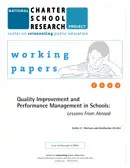Despite decades of school reform in the United States, policymakers continue to rely on a limited set of tools for managing performance and improving school quality even as schools continue to falter and exhibit serious quality deficiencies. This paper considers systematic school reform efforts in Australia, New Zealand and England. In each, the national government took steps to heighten accountability, decentralize governance and invest in schools’ capacity to improve performance.
This paper highlights strategies governments took when they discovered that accountability, while necessary, could not, on its own, boost school performance. Two quality-improvement tools appear particularly promising: self-review (structured involvement of schools in the assessment process) and collaborative networks (the grouping of similar schools to share problems and potential solutions). By creating “living” organizations that adapt to their changing environmental conditions,
districts can go beyond the “one best system” that has dominated educational governance for decades.






